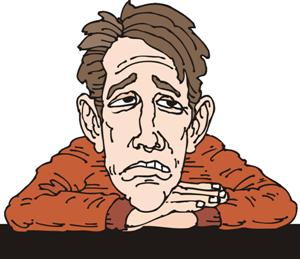COPING
WITH “THE BLUES”
BY
FAMILY NURSE PRACTITIONER NORMA STEPHENS HANNIGAN

Everyone feels sad sometimes—that’s a fact of life. But how often is “sometimes”? What’s a normal amount of sadness? These are important questions for people who find themselves feeling sad, unworthy or “down in the dumps” much of the time. Are you one of them? If so, you may be suffering from depression, a very real, very treatable disorder that affects about 18.8 million people in the United States alone.
What is depression and how does a person know if he/she has it? Depression is a disorder that leaves a person with any or all of the symptoms listed here: persistent sad, anxious, or empty mood; feelings of hopelessness and/or pessimism; feelings of guilt, worthlessness, helplessness; loss of interest or pleasure in hobbies and activities that were once enjoyed, including sex; decreased energy; difficulty concentrating, remembering, making decisions; insomnia, early-morning awakening, or oversleeping; appetite and/or weight loss or overeating and weight gain; thoughts of death or suicide; suicide attempts; restlessness or irritability; persistent physical symptoms that do not respond to treatment, such as headaches, digestive disorders and chronic pain.
Important to note is the word “persistent”—these are feelings that are ongoing, not just once in a while. While all of us feel like this at some point in our lives, it’s the persistence of it that is of concern. Depression may be disabling or a person may have dysthymia, a milder form of depression that isn’t disabling, but keeps someone from feeling as well and happy as they should.
While women often feel hopeless and unworthy, men’s depression may manifest more as anger, overworking, and irritability. Seeking help for depression can be difficult for anyone, but it seems that it is more so for men. Keep in mind that health care providers are bound by law to maintain confidentiality about conditions you discuss with them so that you can feel more comfortable talking about issues that concern you.
What causes depression? No one knows for sure what causes depression. It may run in some families, but it doesn’t necessarily mean that if your mother had it that you will. On the contrary, there may not be any history of depression in your family but that doesn’t prevent you from getting it. There is an imbalance of certain brain chemicals that contributes to depression. Bipolar disorder—depression alternating with mania (very agitated behavior, inappropriateness, elation, talking a lot) seems to occur in people who are genetically a bit different. Women suffer from depression about twice as often as men do; it seems to be associated with hormonal changes, such as birth and the monthly changes that occur in a woman’s body. Depression can be brought on by other life changes such as divorce, death, job difficulties or loss, or anything a person finds very stressful. Chronic illness can contribute to feelings of depression as well.
Can depression be treated? Absolutely! The worst part about depression is that many people feel it’s a personal failing on their part or that others will be judgmental of them if they admit to feeling depressed. For the depressed person who just can’t get out of bed, criticism of their “laziness” only makes things worse. But the good news is that there is help. There are many different types of medications to help people get back on their feet, back to work and taking care of themselves and their families. Some of the medicines do not work immediately, so it’s important for you or your loved one who is taking anti-depressants to be patient and continue the medicines as directed by the prescriber. If a particular medicine doesn’t provide relief, there are many others that can be tried. While anti-depressants are wonderful for quicker relief, it’s important to also consider talk therapy in addition to the medicine. Studies have shown that the combination of the two treatments has the best chance of improvement, rather than just focusing on one or the other.
What are the risks of untreated depression? Men are about four times more likely than women to commit suicide. Major depressive episodes can prevent people from going to work, which could lead to unemployment. Mothers plagued by post-partum depression are often unable to take care of their children and may even harm them. Because chronic illness is so stressful, families may break apart when there seems to be no light at the end of the tunnel.
Where can you get help? Many folks feel uncomfortable about seeing a mental health professional right off the bat and prefer to go to their nurse practitioner or doctor first. In many offices there are questionnaires and other tools in addition to the history you give that can help your health care provider to determine if what you are feeling is depression. That person can treat you with anti-depressant medications and refer you to a mental health provider for further counseling; remember that these two together are very important.
There are some special concerns for truckers. Some drivers don’t want to take medication because they are worried about their DOT drug screens. If you are diagnosed with depression, there is a space on the form to include any medicines you might be taking legally, so you need not be overly concerned about having a problem with your screen. Discuss this with your provider; there are many anti-depressants that will not be problematic when it comes to your urine drug test, so make sure that what is being prescribed for you is one of these. Some of the medicines carry a warning about drowsiness, so the first time you take it should be at a time when you will not be driving.
Please, if you need treatment, get it. Spread the word to friends and loved ones that depression is treatable—you just might save someone’s life!
Copyright ©
2005 10-4 Magazine and Tenfourmagazine.com
PO Box 7377 Huntington Beach, CA, 92615 tel. (714) 378-9990 fax
(714) 962-8506
